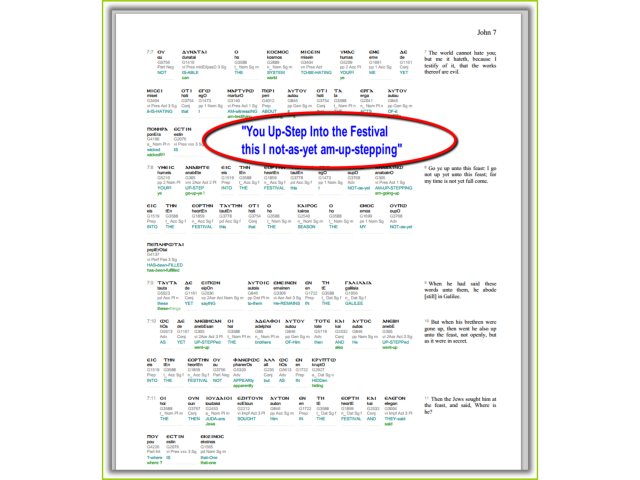veryberry
Member
- Feb 1, 2012
- 338
- 0
Here is John 7: 8-10 from a few different versions. Notice how Jesus tells his brothers that He is NOT going to the feast and yet he goes anyways.
American Standard Version (ASV)
8 Go ye up unto the feast: I go not up unto this feast; because my time is not yet fulfilled.
9 And having said these things unto them, he abode still in Galilee.
10 But when his brethren were gone up unto the feast, then went he also up, not publicly, but as it were in secret.
Common English Bible (CEB)
8 You go up to the festival. I’m not going to this one because my time hasn’t yet come.”
9 Having said this, he stayed in Galilee.
10 However, after his brothers left for the festival, he went too—not openly but in secret.
Douay-Rhiems
8 Go you up to this festival day, but I go not up to this festival day: because my time is not accomplished.
9 When he had said these things, he himself stayed in Galilee.
10 But after his brethren were gone up, then he also went up to the feast, not openly, but, as it were, in secret.
English Standard Version (ESV)
8 You go up to the feast. I am not going up to this feast, for my time has not yet fully come.”
9 After saying this, he remained in Galilee.
10 But after his brothers had gone up to the feast, then he also went up, not publicly but in private.
New American Standard Version (NASV)
8 Go up to the feast yourselves; I do not go up to this feast because My time has not yet fully come.”
9 Having said these things to them, He stayed in Galilee.
10 But when His brothers had gone up to the feast, then He Himself also went up, not publicly, but as if, in secret.
New International Version (NIV)
8 You go to the festival. I am not going up to this festival, because my time has not yet fully come.”
9 After he had said this, he stayed in Galilee.
10 However, after his brothers had left for the festival, he went also, not publicly, but in secret.
New Living Translation (NLT)
8 You go on. I’m not going to this festival, because my time has not yet come.”
9 After saying these things, Jesus remained in Galilee.
10 But after his brothers left for the festival, Jesus also went, though secretly, staying out of public view.
Now how does the King James translate it? Notice the word of truth in bold that has been mistakenly omitted by the other versions.
King James
8 Go ye up unto this feast: I go not up yet unto this feast: for my time is not yet full come.
9 When he had said these words unto them, he abode still in Galilee.
10 But when his brethren were gone up, then went he also up unto the feast, not openly, but as it were in secret
American Standard Version (ASV)
8 Go ye up unto the feast: I go not up unto this feast; because my time is not yet fulfilled.
9 And having said these things unto them, he abode still in Galilee.
10 But when his brethren were gone up unto the feast, then went he also up, not publicly, but as it were in secret.
Common English Bible (CEB)
8 You go up to the festival. I’m not going to this one because my time hasn’t yet come.”
9 Having said this, he stayed in Galilee.
10 However, after his brothers left for the festival, he went too—not openly but in secret.
Douay-Rhiems
8 Go you up to this festival day, but I go not up to this festival day: because my time is not accomplished.
9 When he had said these things, he himself stayed in Galilee.
10 But after his brethren were gone up, then he also went up to the feast, not openly, but, as it were, in secret.
English Standard Version (ESV)
8 You go up to the feast. I am not going up to this feast, for my time has not yet fully come.”
9 After saying this, he remained in Galilee.
10 But after his brothers had gone up to the feast, then he also went up, not publicly but in private.
New American Standard Version (NASV)
8 Go up to the feast yourselves; I do not go up to this feast because My time has not yet fully come.”
9 Having said these things to them, He stayed in Galilee.
10 But when His brothers had gone up to the feast, then He Himself also went up, not publicly, but as if, in secret.
New International Version (NIV)
8 You go to the festival. I am not going up to this festival, because my time has not yet fully come.”
9 After he had said this, he stayed in Galilee.
10 However, after his brothers had left for the festival, he went also, not publicly, but in secret.
New Living Translation (NLT)
8 You go on. I’m not going to this festival, because my time has not yet come.”
9 After saying these things, Jesus remained in Galilee.
10 But after his brothers left for the festival, Jesus also went, though secretly, staying out of public view.
Now how does the King James translate it? Notice the word of truth in bold that has been mistakenly omitted by the other versions.
King James
8 Go ye up unto this feast: I go not up yet unto this feast: for my time is not yet full come.
9 When he had said these words unto them, he abode still in Galilee.
10 But when his brethren were gone up, then went he also up unto the feast, not openly, but as it were in secret






